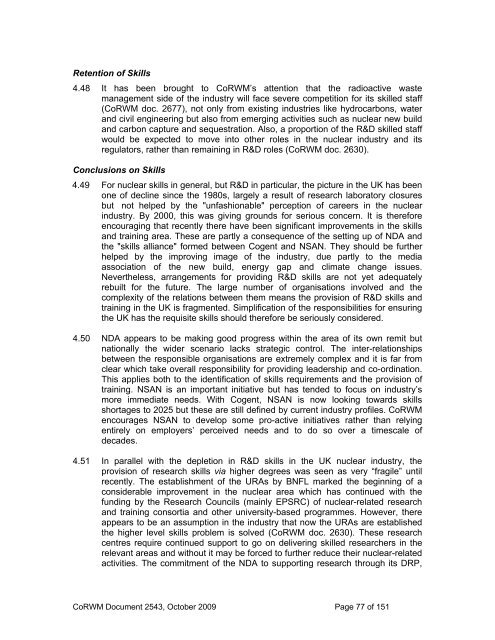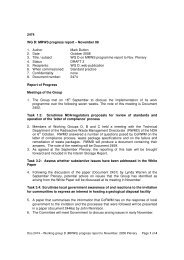2009 Report to Government on National Research and
2009 Report to Government on National Research and
2009 Report to Government on National Research and
- TAGS
- corwm.decc.gov.uk
Create successful ePaper yourself
Turn your PDF publications into a flip-book with our unique Google optimized e-Paper software.
Retenti<strong>on</strong> of Skills<br />
4.48 It has been brought <str<strong>on</strong>g>to</str<strong>on</strong>g> CoRWM’s attenti<strong>on</strong> that the radioactive waste<br />
management side of the industry will face severe competiti<strong>on</strong> for its skilled staff<br />
(CoRWM doc. 2677), not <strong>on</strong>ly from existing industries like hydrocarb<strong>on</strong>s, water<br />
<strong>and</strong> civil engineering but also from emerging activities such as nuclear new build<br />
<strong>and</strong> carb<strong>on</strong> capture <strong>and</strong> sequestrati<strong>on</strong>. Also, a proporti<strong>on</strong> of the R&D skilled staff<br />
would be expected <str<strong>on</strong>g>to</str<strong>on</strong>g> move in<str<strong>on</strong>g>to</str<strong>on</strong>g> other roles in the nuclear industry <strong>and</strong> its<br />
regula<str<strong>on</strong>g>to</str<strong>on</strong>g>rs, rather than remaining in R&D roles (CoRWM doc. 2630).<br />
C<strong>on</strong>clusi<strong>on</strong>s <strong>on</strong> Skills<br />
4.49 For nuclear skills in general, but R&D in particular, the picture in the UK has been<br />
<strong>on</strong>e of decline since the 1980s, largely a result of research labora<str<strong>on</strong>g>to</str<strong>on</strong>g>ry closures<br />
but not helped by the "unfashi<strong>on</strong>able" percepti<strong>on</strong> of careers in the nuclear<br />
industry. By 2000, this was giving grounds for serious c<strong>on</strong>cern. It is therefore<br />
encouraging that recently there have been significant improvements in the skills<br />
<strong>and</strong> training area. These are partly a c<strong>on</strong>sequence of the setting up of NDA <strong>and</strong><br />
the "skills alliance" formed between Cogent <strong>and</strong> NSAN. They should be further<br />
helped by the improving image of the industry, due partly <str<strong>on</strong>g>to</str<strong>on</strong>g> the media<br />
associati<strong>on</strong> of the new build, energy gap <strong>and</strong> climate change issues.<br />
Nevertheless, arrangements for providing R&D skills are not yet adequately<br />
rebuilt for the future. The large number of organisati<strong>on</strong>s involved <strong>and</strong> the<br />
complexity of the relati<strong>on</strong>s between them means the provisi<strong>on</strong> of R&D skills <strong>and</strong><br />
training in the UK is fragmented. Simplificati<strong>on</strong> of the resp<strong>on</strong>sibilities for ensuring<br />
the UK has the requisite skills should therefore be seriously c<strong>on</strong>sidered.<br />
4.50 NDA appears <str<strong>on</strong>g>to</str<strong>on</strong>g> be making good progress within the area of its own remit but<br />
nati<strong>on</strong>ally the wider scenario lacks strategic c<strong>on</strong>trol. The inter-relati<strong>on</strong>ships<br />
between the resp<strong>on</strong>sible organisati<strong>on</strong>s are extremely complex <strong>and</strong> it is far from<br />
clear which take overall resp<strong>on</strong>sibility for providing leadership <strong>and</strong> co-ordinati<strong>on</strong>.<br />
This applies both <str<strong>on</strong>g>to</str<strong>on</strong>g> the identificati<strong>on</strong> of skills requirements <strong>and</strong> the provisi<strong>on</strong> of<br />
training. NSAN is an important initiative but has tended <str<strong>on</strong>g>to</str<strong>on</strong>g> focus <strong>on</strong> industry’s<br />
more immediate needs. With Cogent, NSAN is now looking <str<strong>on</strong>g>to</str<strong>on</strong>g>wards skills<br />
shortages <str<strong>on</strong>g>to</str<strong>on</strong>g> 2025 but these are still defined by current industry profiles. CoRWM<br />
encourages NSAN <str<strong>on</strong>g>to</str<strong>on</strong>g> develop some pro-active initiatives rather than relying<br />
entirely <strong>on</strong> employers’ perceived needs <strong>and</strong> <str<strong>on</strong>g>to</str<strong>on</strong>g> do so over a timescale of<br />
decades.<br />
4.51 In parallel with the depleti<strong>on</strong> in R&D skills in the UK nuclear industry, the<br />
provisi<strong>on</strong> of research skills via higher degrees was seen as very “fragile” until<br />
recently. The establishment of the URAs by BNFL marked the beginning of a<br />
c<strong>on</strong>siderable improvement in the nuclear area which has c<strong>on</strong>tinued with the<br />
funding by the <strong>Research</strong> Councils (mainly EPSRC) of nuclear-related research<br />
<strong>and</strong> training c<strong>on</strong>sortia <strong>and</strong> other university-based programmes. However, there<br />
appears <str<strong>on</strong>g>to</str<strong>on</strong>g> be an assumpti<strong>on</strong> in the industry that now the URAs are established<br />
the higher level skills problem is solved (CoRWM doc. 2630). These research<br />
centres require c<strong>on</strong>tinued support <str<strong>on</strong>g>to</str<strong>on</strong>g> go <strong>on</strong> delivering skilled researchers in the<br />
relevant areas <strong>and</strong> without it may be forced <str<strong>on</strong>g>to</str<strong>on</strong>g> further reduce their nuclear-related<br />
activities. The commitment of the NDA <str<strong>on</strong>g>to</str<strong>on</strong>g> supporting research through its DRP,<br />
CoRWM Document 2543, Oc<str<strong>on</strong>g>to</str<strong>on</strong>g>ber <str<strong>on</strong>g>2009</str<strong>on</strong>g> Page 77 of 151



